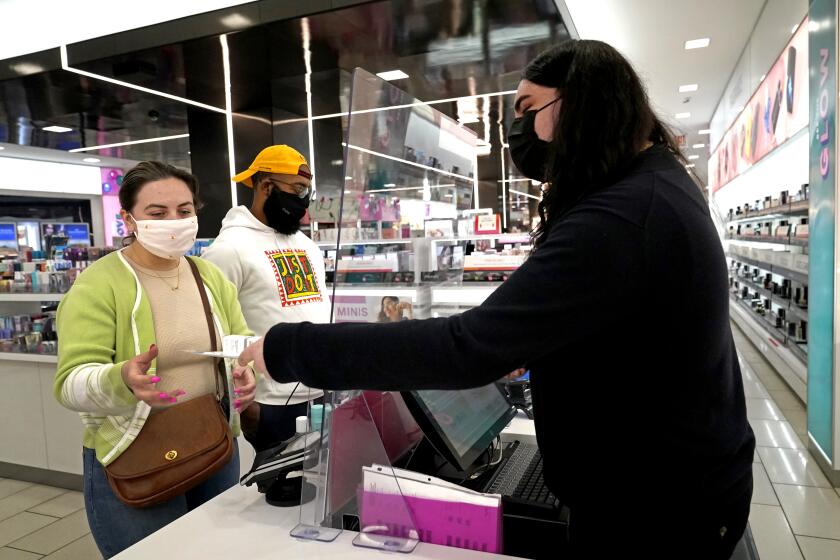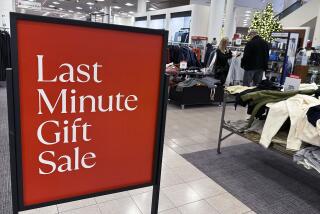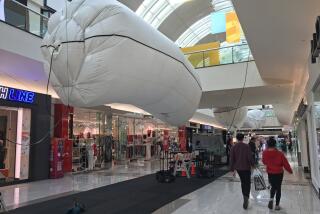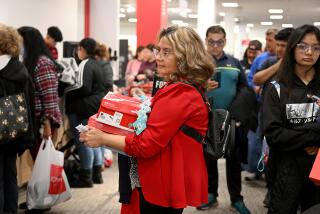Black Friday lures shoppers, despite the pandemic
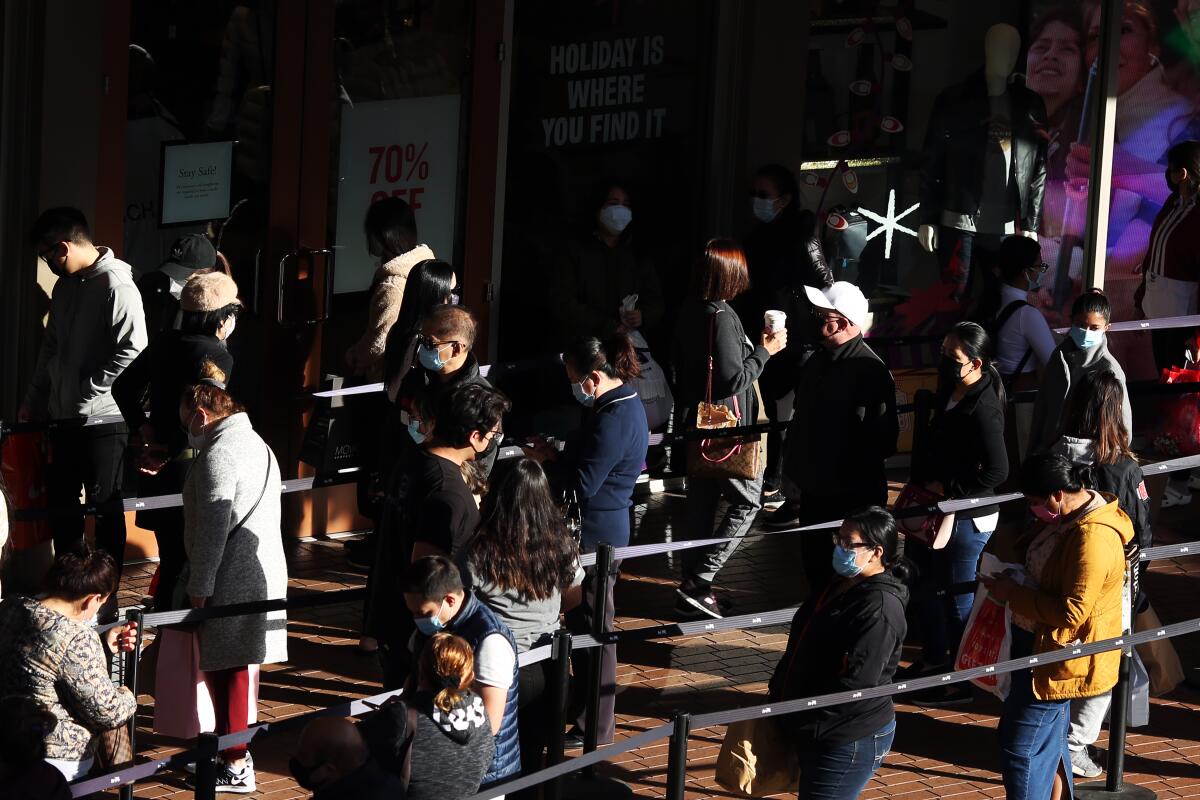
The crowds appeared smaller and the lines seemed shorter than in a typical year, but some shoppers did wake early for Black Friday deals.
Retailers expected that 2020 would bring a subdued Black Friday, as coronavirus cases soar across the United States. Customers cautious about contracting the virus are expected to shop from home, accelerating the trend toward e-commerce. In parts of the country, public health rules are restricting stores from welcoming the hordes of customers that have come to define the start of the holiday shopping season.
But those concerns and restrictions did not deter some shoppers.
Shayla Menendez, 14, and her family pulled into the parking lot at Citadel Outlets in Commerce Friday at 4:30 a.m., when the sky was still black. She wore blue latex gloves and a pink patterned mask, with a second cloth face covering peeking out at the edge — extra protection “only for today,” she said.
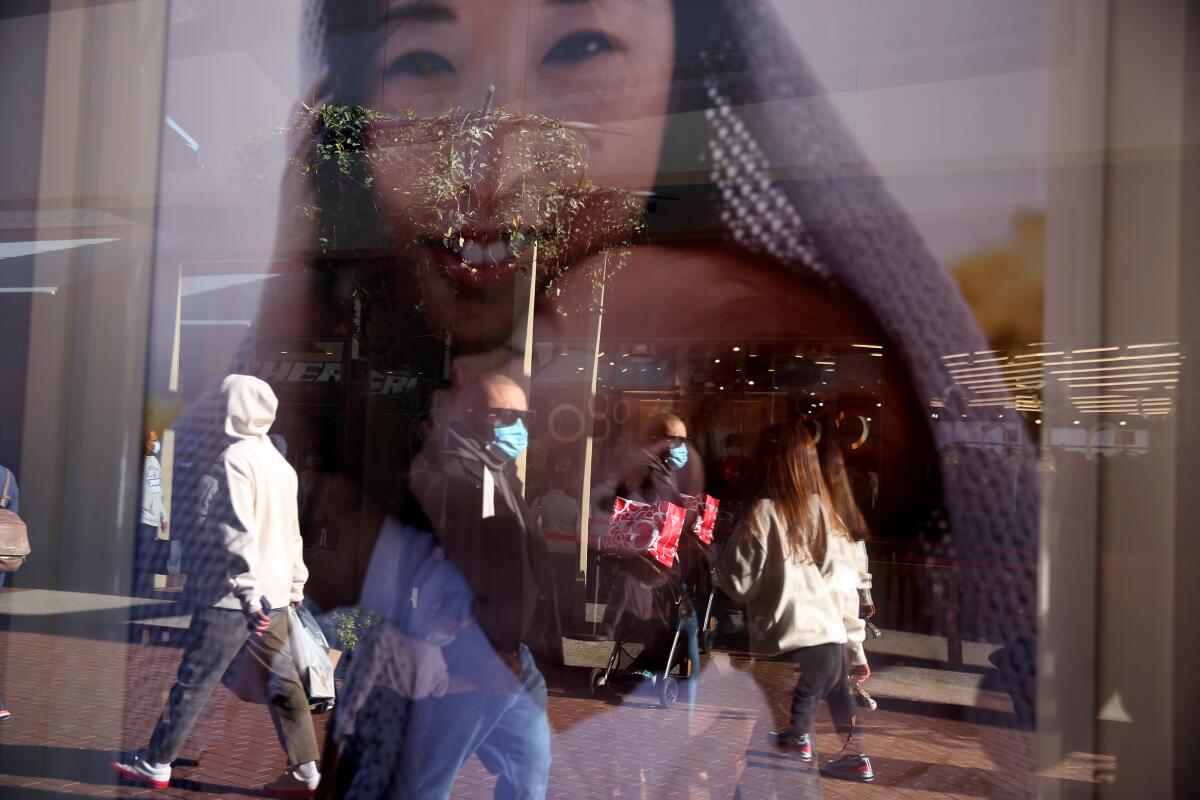
Stores opened at 6 a.m. Soon after, Menendez bought a Michael Kors wallet for her mom; it ended up buried beneath the morning’s other purchases in a Gap shopping bag. “She’ll love it,” Menendez said.
Those who arrived early in Commerce to beat the usual lines found just a thin stream of people filing into the outdoor shopping center. Stores in Los Angeles County must limit occupancy to 25%, creating queues of shoppers, mostly keeping socially distanced, outside the doors of popular locations.
It’s a uniquely difficult time to be working retail this Black Friday, as coronavirus cases in California surge higher than at any other point in the pandemic.
“It’s much shorter, and it’s moving more quickly,” said Gladys Delgado, 50, who stood in line outside Michael Kors with her daughter Adriana.
Adriana was worried about the spread of the coronavirus among the crowds of Black Friday shoppers but felt comforted after researching the safety precautions stores have rolled out.
Her mother was less bothered.
“People have been respectful in this area about wearing masks and keeping their distance. If they weren’t doing that, we could just leave,” Delgado said.
They get up early to go shopping on Black Friday every year.
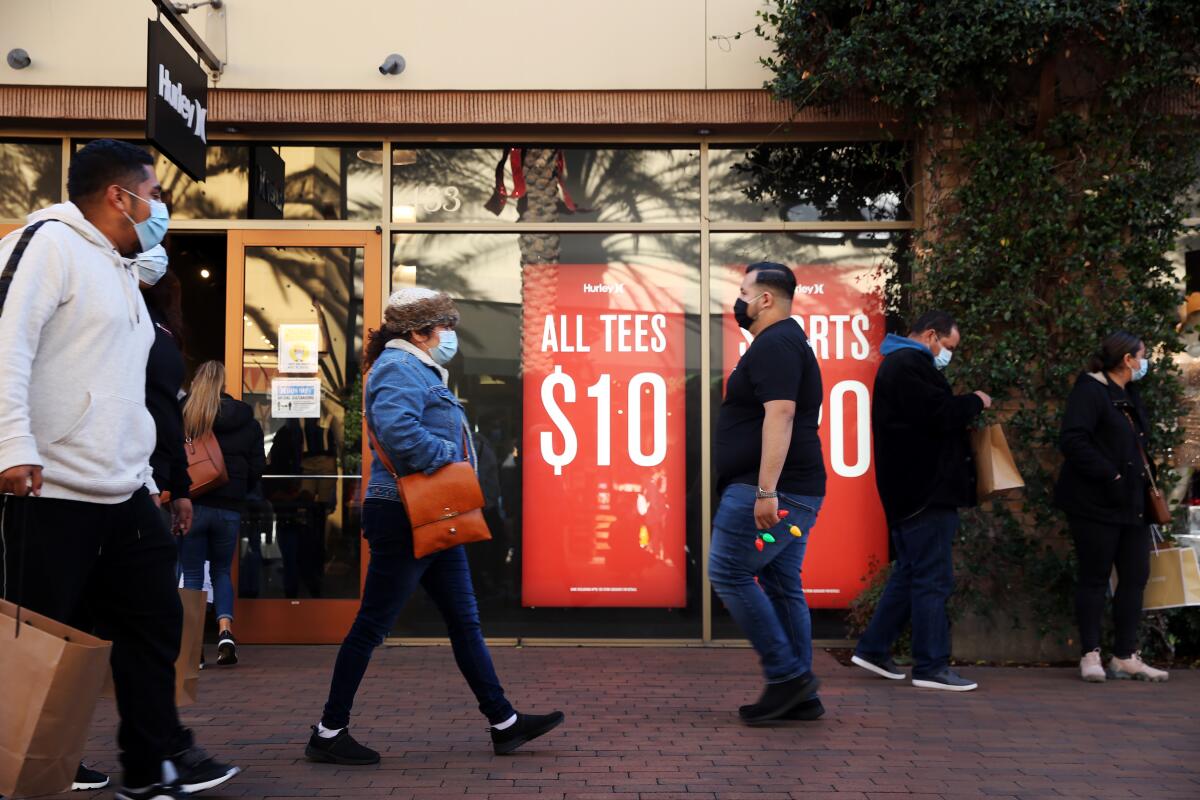
“It’s tradition,” Delgado said, adding that it’s important to “get out and get some fresh air” this year, with the pandemic taking away so many activities.
Many shoppers Friday morning were motivated by custom.
As the sun rose over Union Square in San Francisco, Noah Bartoni, 19, of Fairfield sipped a drink from Starbucks with his aunt and uncle and looked out from the fourth-floor windows at Macy’s. For years, it has been “family tradition” for Bartoni and his siblings to join his aunt and uncle for Black Friday shopping. This year, “I get all the attention to myself,” he joked.
And this year, Macy’s was quiet.
“We’re always right down there in the cold from 5 a.m. waiting in line,” Bartoni said as he gazed at the street below.
Such scenes reflect the expectations of many in the retail industry.
At Citadel Outlets, business was probably a quarter that of a typical Black Friday, estimated Steven L. Craig, president and chief executive at Craig Realty Group, which owns the mall.
Don’t be deceived by the lines, he said: Capacity limits in stores force customers to wait outside, creating the illusion that the mall is busier than it is. (For example, in accordance with the 25% capacity rule, the Swarovski jewelry store could allow only four people inside; with two staff members, that means only two customers at a time.) It’s “pretty quiet,” Craig said.
The holiday shopping season is of “enormous importance” to Citadel Outlets and the broader retail industry, he said. “It can be the difference between making a profit or a loss.”
Reaching typical annual sales numbers is an “absolute impossibility” at this point, Craig said, assuming the low traffic on Black Friday reflects the level of business the shopping center will see over the next few weeks. Citadel and other malls are still trying to catch up after months-long closures at the onset of the pandemic.
While many retailers have been hanging on by a thread during the pandemic, those with expansive e-commerce operations, like Amazon, Walmart and Target, have seen remarkable growth, showing that quiet stores don’t necessarily mean a dive in overall holiday spending.
Online shopping hit a Thanksgiving record on Thursday, according to data from Adobe Analytics, jumping 21.5% from last year to $5.1 billion. Adobe forecasts online spending to hit $8.9 billion on Black Friday, a jump of 20% from last year. The National Retail Federation predicted last week that November-to-December sales, both in-store and online, would range from $755.3 billion to $766.7 billion — a year-over-year uptick of 3.6% to 5.2%.
Dollars spent in the six-week shopping period to Nov. 14 were up 13% compared with the same period last year, led by purchases of video games, small appliances, technology, toys, office supplies and books, according to market research firm NPD Group. Companies selling electronics, home products or comfortable clothing, including pajamas and athleisure, were likely winners on Black Friday, analysts said.
Some shoppers continue to eschew online ordering for in-person convenience.
“I’m just impatient. I want to have my stuff now,” said Christian Zuniga, 22, arm looped with shopping bags Friday at the Glendale Galleria.
His friend agreed.
“If you buy something online, and you don’t like how it looks or it doesn’t fit, you’re kind of screwed,” said Elijah Valle, 21.
Among the most coveted items on Black Friday were Microsoft Corp.’s Xbox Series X and Sony Corp.’s PlayStation 5, released earlier this month. While the indoor Glendale Galleria was relatively quiet, the GameStop store on the third floor drew a long line, said the mall’s senior general manager, Steven Sayers.
“Everyone’s trying to grab a PS5,” he said. “There was a rumor today that select stores got new shipments.”
Retailers took steps to discourage crowding.
Sayers gets alerts every hour from Microsoft’s analytics program with the mall’s occupancy figures. If it got close to 25% capacity, he said, he would temporarily close the entrances to new visitors.
Many stores implemented or expanded curbside pickup and spread Black Friday deals throughout November. Some major chains that typically open Thanksgiving night to get a jump start on Black Friday sales this year opened early Friday instead.
The Kate Spade and Michael Kors stores at Citadel Outlets stationed iPads with their full catalogs outside; customers could peruse the stock and head to a separate outdoor checkout space to make purchases if they found what they wanted, without physically entering the store.
“It’s a lot more cautious and quiet,” said Neil Saunders, an analyst at GlobalData Retail. “That was somewhat deliberate. Retailers did not want big crowds in stores — they didn’t want people pushing their noses up against the glass and waiting to surge in, because of the pandemic. They helped engineer this to be a quieter day.”
While elected officials across the state urged Californians to change their Thanksgiving traditions by avoiding large family gatherings, there was little talk of dissuading shoppers from visiting stores on Black Friday.
Retail workers worried about their own safety, bracing for an influx of shoppers as the average number of new coronavirus cases in California tripled in the last month alone.
Under Armour employee Daniel Cancel, 20, said that in some ways, shoppers at Citadel Outlets were easier to manage this year, because only a few were allowed in the store at a time.
“But people get cranky waiting in line. When they get upset, I give them a coupon,” Cancel said.
Some shoppers said they were motivated by discounts.
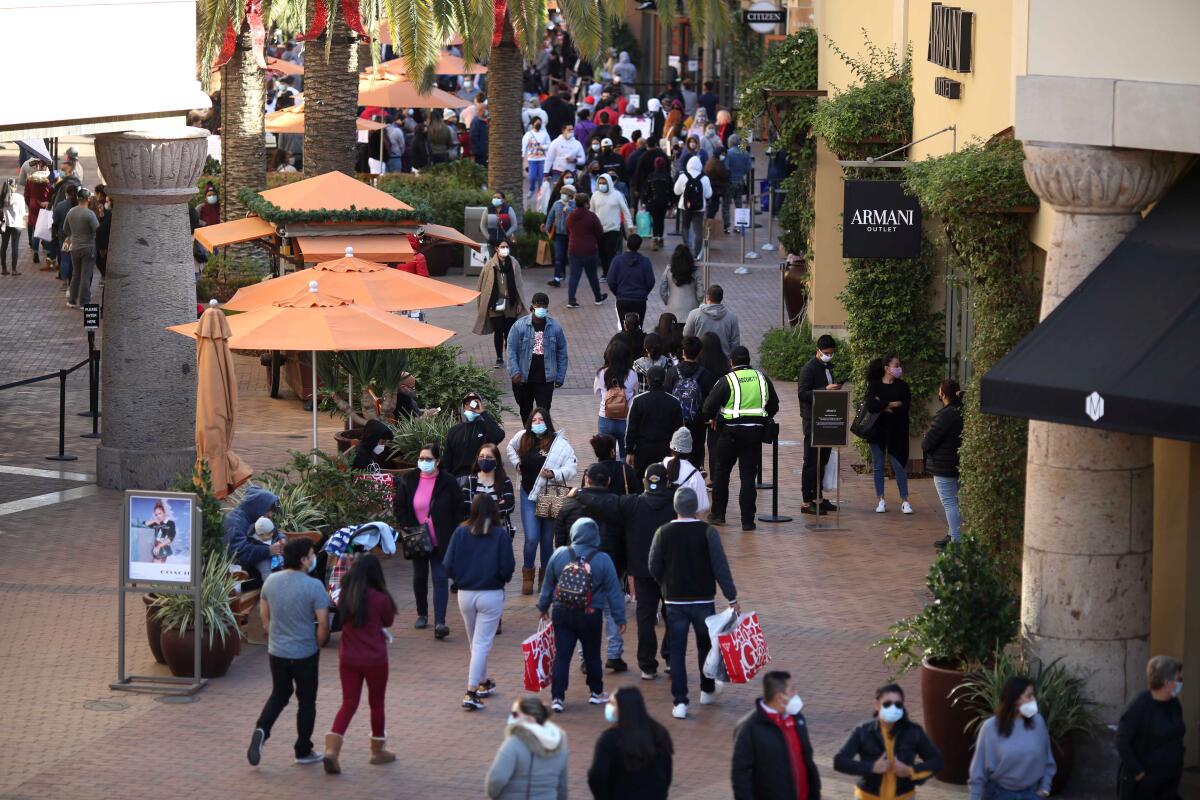
Last year, Lesley Aragon, 22, couldn’t even make it to the outlet mall because of a traffic jam to get into the parking lot. This year, the San Gabriel Valley resident found a spot in line outside the Nike store when she arrived at the mall at 4:30 a.m. Merchandise was 30% off, and she purchased six pairs of leggings and sweatpants.
“Their stuff is so high-priced usually,” she said.
With everyone masked, and hand sanitizer dispensers standing sentry at store doors, shopping during the pandemic isn’t like it normally is, Aragon said.
“We’re not touching anything we don’t have to,” she said. “It’s a whole different vibe this year.”
